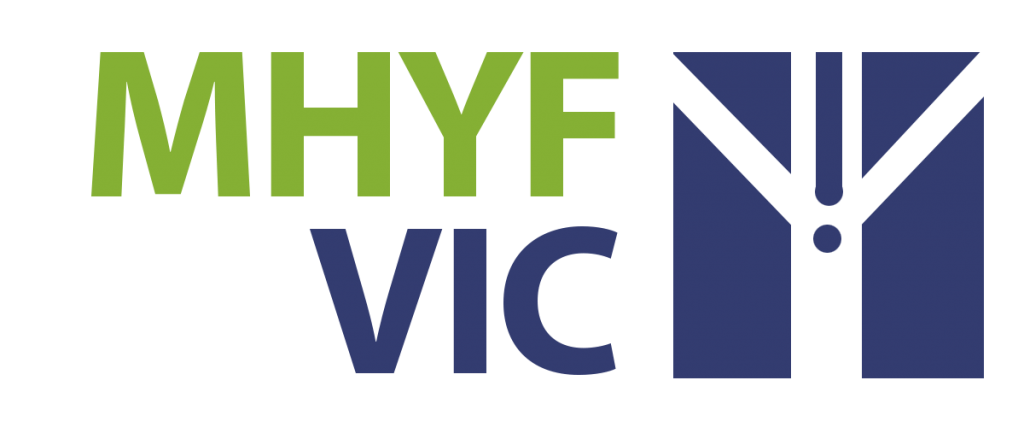
Mental Health for the Young & their Families in Victoria is a collaborative partnership between mental health & other health professionals, service users & the general public.
Mailing Address
MHYFVic
PO Box 206,
Parkville, Vic 3052
PROJECT EVIDENCE for Mental Health Promotion. The project coordinator is Dr Allan Mawdsley. The version can be amended by consent. If you wish to contribute to the project, please email admin@mhyfvic.org
[9] Mental Health Promotion
In addition to direct clinical casework, there are several other ways in which specialized mental health expertise can be made available to agencies dealing with young people and their families.
a) Community awareness programs
i Involvement of Consumers and Carers
ii Public information campaigns
b) Mental Health consultation to agencies
c) Training
[9 c ] Mental Health training
Emotional disturbances are so widespread through the community that there is a good case for some degree of mental health training for everybody. To some extent this is actually happening in an informal way through public information campaigns and the work of agencies like BeyondBlue. [See PE9a ii ].
Some specific basic training is needed for workers whose work is not within mental health services but who encounter clients displaying symptoms of mental disorder. An understanding of the likely meaning of such symptoms and how they might be dealt with can be crucial to achieving a successful outcome.
In addition to basic training there is a need for availability of consultancy services [see PE 9b] and mechanisms for specialist referral when appropriate. Immediate referral may not be available geographically or financially, nor appropriate if clients are uncomfortable, and a process of engagement may be required for success.
General hospital and municipal social work departments often deal with clients experiencing considerable stress. So, too, do non-psychiatrist Medical Practitioners, Child Protection workers, Probation Officers and social workers in non-government agencies dealing with unemployment and housing problems. Maternal & Child Health nurses, Youth workers and support workers for out-of-home care will also encounter clients with coping difficulties.
Most such workers will not have had the mental health training they need. The basic tertiary education courses of most allied health professions (such as Social Work, Psychology, Occupational Therapy, Speech Pathology, and Nursing) have useful foundation components but insufficient understanding of the range of mental health clinical disorders or assessment methods.
Basic training to meet this need is available for all such workers. See comments below on Basic Training.
School teachers quickly identify attentional and behavioural problems but may be uncertain about depression and anxiety linked with underperformance. Learning disorders are often not identified at an early stage and challenging behaviours may ensue. Consultation with psychologists of the School Support Service may assist with this but collaboration with specialist mental health services may also be required.
The training of specialist mental health workers is at a much more advanced level. This is generally acquired by advanced training courses or occasionally by on-the-job training. Such “apprenticeship” training is very dependent upon the available experiences and supervision. See comments below on Advanced Training.
The Victorian State Government Mental Health Branch has sponsored a training centre, ‘mindful’, which attempts to promote a benchmark standard of information on clinical disorders and clinical assessment approaches (supervised practice). It is considered that every clinician working in face-to-face casework should have undertaken at least this foundational training. It is known as the Developmental Psychiatry course (DPC).
BASIC TRAINING
The DPC occupies one day each week of the academic year. It has three areas of study – normal child development, clinical disorders (mornings) and clinical assessment (afternoons).
Child development is studied because the whole course has a developmental underpinning. Clinical symptomatology evolves as children grow and acquire more complex abilities in the physical, intellectual, language and social domains.
The bio-psycho-social foundation of development is also the paradigm used for clinical assessment. The study is undertaken in a short series of lecture presentations combined with a longitudinal assignment of weekly observations of an infant over the period of the academic year. There is no limit on group size for presentations, but infant observations are one-on-one privately.
Clinical disorders, likewise, are understood from a biopsychosocial perspective and their primary symptomatology of developmental, mood, cognitive and social/emotional functioning meshes directly with the training in clinical assessment. There is no limit on group size for presentations.
Clinical assessment training is a series of new case assessments undertaken in a one-way screen interview room.
Whenever practicable, the assessments involve four sessions over four weeks including a family group session, parent interview and child interview sessions, followed by a feedback and treatment planning session. Each assessment is undertaken by one trainee together with an experienced clinician who will take responsibility for the treatment agreed at the feedback session.
Other trainees observe the assessment and take part in the training discussion that follows each session. Of course, such assessments are only with families who consent to those arrangements. Subsequent assessments are undertaken by other participants in the training group. To ensure that every trainee undertakes at least one assessment in addition to observing those of other trainees, the maximum group size would be eight or nine in any academic year.
The interviews cover presenting symptoms, past and current medical history, past and current social/family history, family functioning and an age-appropriate physical health and mental state assessment (cognitive intellectual abilities, reasoning, memory, thought processing, language skills, affect and executive functioning) of the referred child.
The goals of the assessment are:
Each trainee is required to develop a case formulation and management plan for cases observed as well as for the cases interviewed by themselves. In this way every member of a trainee group will have experience of multiple cases over the course of the academic year. It must be acknowledged that this is a child-centred approach, rather than family-centred, and that further training is required whenever therapeutic skills are to be developed.
This form of training is desirable for any Tier One workers, such as those in non-Government agency support worker roles, and as a basic start for Tier Two and Tier Three workers going on to more advanced training.
ADVANCED TRAINING
Clinical Psychologist and Child & Adolescent Psychiatrist advanced training courses will routinely involve deeper study of all the areas mentioned in the discussion of basic training plus considerable additional supervised clinical casework and therapies.
However, other professionals employed in mental health services require additional advanced training which is not routinely part of their professional affiliation. In particular, this training should include child development, typical childhood presentations of mental disorders (especially cognitive and autism spectrum disorders), utilisation of multidisciplinary collaboration and training in evidence-based outcome evaluation.
The most common additional specialist training is in Family Therapy. Highly regarded training is available through a number of programs accredited by the Australian Association of Family Therapy. A great advantage of Family Therapy is that it is a relationship-based therapy that has strong behavioural change power because of its inter-personal attachments.
This is especially valuable in dealing with psychosocial dysfunction but can also be combined with biological treatments such as anti-psychotic medication when required within a management plan. There is also good evidence for its effectiveness with depression and anxiety, especially when combined with psychoeducation. When there is disability, cognitive disorder, illness or addiction within the family, family therapy is also effective in enabling different family members’ narratives to be expressed and heard.
Psychodynamic psychotherapy training is available in University Graduate Diploma courses or Masters Degree courses. Cognitive Behavioural Therapy training is available through the Australian Psychological Society and a number of private training institutes. Group Therapy training and a small range of less mainstream therapies like Dialectical Behaviour Therapy (for Borderline Personality Disorder) and Rapid Eye Movement Desensitization Therapy (for PTSD) are available for specific treatment areas.
Irrespective of the style of therapy used, it is desirable for accurate case records to be kept and for practice to be subject to professional supervision.
Last updated 18/6/ 2020
POLICIES for Mental Health Promotion
[9] Mental Health Promotion
a) Community awareness programs
i Involvement of Consumers and Carers
ii Public information campaigns
b) Mental Health consultation to agencies
c) Training
[9 c ] Training
MHYFVic supports the crucial role of ‘mindful’, the Mental Health Training Institute, in the provision of its specialist training programs, especially the Developmental Psychiatry Course.
MHYFVic advocates that all human services agencies provide their support staff with appropriate mental health training commensurate with the risks and responsibilities of their roles.
MHYFVic advocates that all human services agencies ensure that their support staff have appropriate mental health consultancy services available when required.
MHYFVic advocates that all regional specialist Mental Health Services provide consultancy services to other human services agencies. [See Pe9b, BP9b]
Last updated 2/6/2020
BEST PRACTICE MODELS for Mental Health Promotion
[9] Mental Health Promotion
a) Community awareness programs
i Involvement of Consumers and Carers
ii Public information campaigns
b) Mental Health consultation to agencies
c) Training
[9 c ] Mental Health training
Human services agencies in the health, education and welfare fields will have many clients experiencing stress and relationship difficulties that can result in mental health disorders. It is appropriate for staff dealing with clients to have a basic understanding of mental health issues and access to consultancy services of specialist mental health professionals.
The extent of necessary training will vary hugely, depending on the degree of support inherent in the agency’s services. Staff in over-the-counter roles may need only a brief orientation, whilst those in counselling will need basic training and those in Tier Two and Tier Three treatment agencies will need advanced training.
The training should be commensurate with the responsibilities of the role. Agency management is responsible for ensuring that appropriate training is provided for their staff and for liaising with specialist mental health services for case consultation when necessary.
Large agencies will ordinarily arrange their own brief orientation programs for staff. Additional contributions to this may be available from specialist mental health services as part of their Mental Health Promotion mandate.
Agency caseworkers who may encounter clients with mental disorders require at least basic training. The Best Practice model is for the staff to undertake the Developmental Psychiatry course (DPC) or its equivalent. [See PE9c]. Caseworkers supporting families with manifest disturbance, such as kinship care for children in out-of-home care, need advanced training such as Family Therapy training. [See PE9c].
Last updated 2/6/2020
We welcome discussion about any of the topics in our Roadmap epecially any wish to develop the information or policies.
Please send your comments by email to admin@mhyfvic.org
Speak about issues that concern you such as gaps in services, things that shouldn’t have happened, or things that ought to happen but haven’t; to make a better quality of service…….
Help achieve better access to services & better co-ordination between services together we can…….

Mental Health for the Young & their Families in Victoria is a collaborative partnership between mental health & other health professionals, service users & the general public.
MHYFVic
PO Box 206,
Parkville, Vic 3052

Please fill in the details below and agree to the conditions to apply for MHYFVic membership.